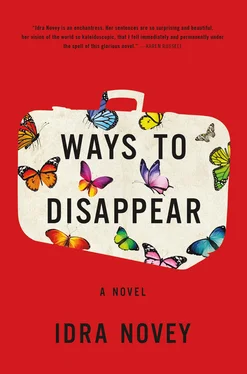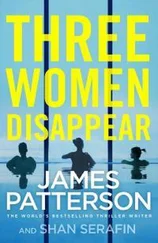One night, after they’d sat talking for hours on the balcony, Emma had asked Beatriz if she’d made a deliberate point of not writing about her children. Beatriz had looked at her with confusion and said the novel Emma had just translated was all about them. Emma had blushed and said of course, she meant earlier, in other books.
Once Beatriz said it, the parallels between the mayors in the novel and her offspring were obvious. Have You Tasted the Butterflies followed the fates of two mayors running adjacent towns along the Amazon River. One of the mayors was industrious and continually repainting and rebuilding the docks to draw in tourists and their dollars. Regardless of what he improved, all the foreigners who came down the river stopped at the town of the other mayor, who rebuilt nothing and shrugged at the problem of townspeople tossing their trash along the riverbank. The rotting piles attracted vultures and thousands of mosquitoes but also great clusters of pink and orange butterflies that landed in fluttering clouds on the arms of travelers who would stand on the broken docks, gasping at the tickle of so many pink wings beating against their skin.
To compete, the industrious mayor planted milkweed and bought vats of caterpillars from various hatcheries. Yet the minute his butterflies emerged, they flickered off to the trash heaps along the banks of the other mayor’s town.
Puta que o pariu, Marcus swore at his mother’s screen. Emma took a quiet step closer to see what he had opened. It was his mother’s Web history, riddled with poker sites.
Let me see that. Raquel pushed her brother to get up and surrender control of the keyboard.
Maybe I should go, Emma said.
No, no, please don’t. Marcus stood up, motioning for her to follow him into the kitchen and leave Raquel to click through the Web history on her own. From the fruit bowl on the kitchen counter he extracted some old lemons, clenched them, and shrugged.
We’ll make do, he said, and began to prepare a trio of caipirinhas, compensating for the limits of the lemons with extra cachaça and sugar. When he handed Emma her glass, he paused to watch her lips close over the rim.
There’s no reason for you to pay for a hotel, he said. My mother liked for you to stay here. The guest room is yours if you want it.

Emma had every intention of being respectful. She wanted to leave every object in her author’s bathroom precisely where it was when she arrived. With Beatriz in the next room, it had never occurred to her to pick up her author’s matted brush and run it through her own hair. Only now Beatriz was not in the next room, and once Emma allowed herself to pick up her author’s brush and pull it through her hair, it became necessary to do it again, and then a third time.
Outside the bathroom, the apartment was so quiet she could hear the thrum of cars along Rua Barata Ribeiro, or perhaps it was something closer: the persimmons and maracujá softening in the kitchen, or the murmur of her author’s books on the shelves, questioning when she might return.
On her last trip to Brazil, Emma had stood next to Beatriz just outside this bathroom and confessed that she hadn’t been quite as dutiful in her last translation as in Beatriz’s earlier books, and Beatriz had replied that duty was for clergy. For translation to be an art, she told Emma, you have to make the uncomfortable but necessary transgressions that an artist makes.
With Beatriz gone, what might qualify as a necessary transgression was even less clear. In coming to Brazil in her author’s absence, she had put herself on trial. In the bathroom mirror, Emma stared at the reflection of her hand, the brush in it that was not hers but to whose bristles she had just added a layer of her hair. In her mind, a medieval courtroom appeared. The walls were made of stones and her view was from the stand. Dozens of spectators were squinting at her, and looking down at herself, she saw why. Her hands and arms had turned hazy at the edges. Her legs, too. When she reached up to touch her face, it was like passing her hand through vapor. Yet everyone in the gallery was staring in her direction. They could see her, or at least found her legible enough to be tried for her alleged crimes.
Emma tried to think from what book or movie she could be recalling such an odd court scene. Unless perhaps the image hadn’t come from elsewhere and was hers, something she’d been storing up for some time but hadn’t been able to recognize as her own until she found herself alone in this apartment and had lifted this brush to her hair. Until she’d heard the snap of her own strands trapped in its bristles.

Raquel picked up her phone to call her boss then decided against it. Thiago had become more than her boss in the nine years they’d been working together, but how much more varied unpredictably. To call him when she was this upset could be a mistake. He might think she couldn’t handle the brutes running the strike up in Minas and he’d give the negotiations to Enrico.
She sat down on her bed. She could always call Marcus but knew she’d hang up feeling lonelier. They’d just disagree again and most likely he was already on the ferry with Emma. Raquel objected to the trip. She’d admitted that she didn’t have any better ideas about where to search, but that was no reason to take a trip based on some story her mother had written twenty years ago. Emma was like all her mother’s pretentious admirers who thought they had a special understanding of her mother because they’d studied her books. But they knew nothing of her mother’s days in bed after calling the aunts in São Paulo for rent money or occasionally for no reason her mother could name. She’d just go on lying there, still as a crocodile with her reptilian-green eyes, listening if Raquel spoke, but unwilling, or unable, to answer.
If her mother was hiding on an island, Raquel was certain it would be one much farther away. Ilha Grande was too close to Rio and full of bourgeois bohemians. Her mother wouldn’t want to be surrounded by a bunch of bobos in flip-flops smoking pot while they texted on their iPhones. The government had dynamited the prison years ago. Raquel had watched the explosion on the news with her mother. As the prison fell, her mother had pointed out the birds flapping upward out of the trees and said, Look, the birds are collapsing into the sky. Raquel had looked reluctantly for the birds through the smoke. She would have liked to have spoken with her mother just once about what was actually happening. A demolition.
When people asked what it was like to be the daughter of someone who came up with such peculiar stories, Raquel told them the truth. She’d never read her mother’s books. She had no patience for the illusion that you could know someone because you knew her novels. What about knowing what a writer had never written down — wasn’t that the real knowledge of who she was?

True to the nature of public transportation in Brazil, the ferry to Ilha Grande was running an hour late. Emma, true to the nature of anxious travelers everywhere, took the opportunity to head to the nearest Internet café. Her inbox contained two messages from Miles but she didn’t open them. She’d paid for only ten minutes and wanted to search for the genus of toad she’d discussed with Marcus in the cab. In English it was called the red-belly.
Scientific name: Melanophryniscus montevidensis.
Читать дальше













